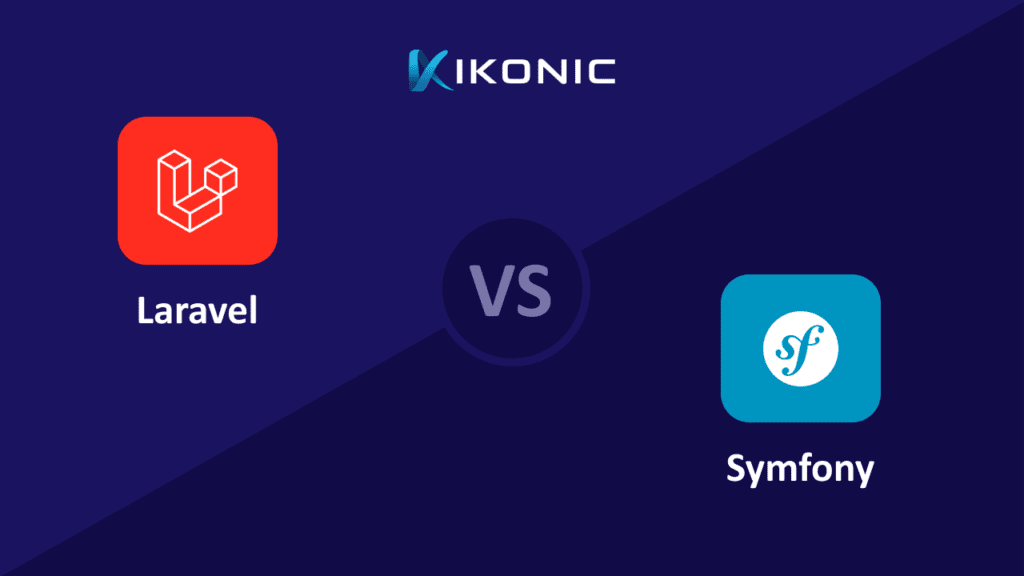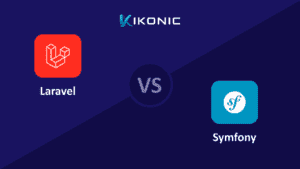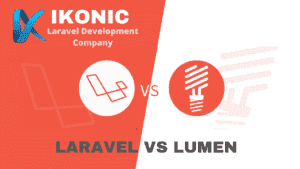When it comes to choosing the ideal PHP framework for your web development project, the decision can often feel overwhelming. With so many options available, it is critical to make a decision that is in line with the objectives and specifications of your project. Among all the PHP frameworks, there is a constant battle between – “Laravel vs Symfony”.
Determining the ideal fit between Laravel and Symfony for your project can pose a challenge. Each framework has its own set of advantages and drawbacks, necessitating a comprehensive understanding before making a choice. To facilitate your decision-making process between Laravel vs Symfony, we’ve have done a concise yet informative comparison. All of your remaining doubts about the two frameworks will be dispelled by examining their key features, performance metrics, scalability, and suitability for different types of projects.
What is Laravel?
Laravel stands as the most widely adopted PHP framework, renowned for its open-source MVC-based structure. This framework empowers development teams to create scalable web applications swiftly. Error correction within Laravel-based apps is efficient, and its development tools are a dependable asset for countless developers.
Laravel- Key Features
Fast Authentication: Laravel streamlines authentication processes, requiring minimal setup for models and controllers, ensuring smooth app operation.
Object Relational Mapping: Laravel’s integrated ORM simplifies database queries through a user-friendly PHP syntax, reducing reliance on SQL code.
MVC Architecture: Laravel excels at MVC-based application development, segregating presentation and business logic to accelerate the process while maintaining code separation.
Artisan Command-Line Interface: The built-in Artisan tool automates repetitive tasks, including skeleton code, data structure, and migration management.
Effective Security: Utilizing the Bcrypt Hashing Algorithm, Laravel ensures robust security measures for web applications.
Original Templating Engine: Laravel’s lightweight templates and widgets offer versatile solutions for integrating CSS and JS code, aiding in streamlined development.
Unit Tests: Laravel supports thorough unit testing, expediting issue identification and contributing to enhanced website performance.
Automatic Pagination: The in-built pagination feature minimizes coding time by managing pagination automatically.
Laravel ApplicationsIn essence, Laravel’s versatility lends itself to a wide array of web applications, ranging from administrative panels and e-commerce solutions to real-time applications and social networking platforms. Its elegant syntax, extensive libraries, and active community make it an excellent choice for modern web development projects. Following are the applications developed with Laravel:
- MyRank
- Laravel Forge
- Invoice Ninja
- Cheesecake Labs
- Belitsoft
- Innowise Group
- October CMS
- Laravel Nova
- Bagisto
- Snipe-IT
- Laravel Eloquent ORM
Is Laravel Suitable for Your Project?
Laravel is an excellent choice for newcomers to web development. Its user-friendly learning curve, efficient authentication, and quick project development make it ideal for smaller-scale projects and those on a budget.
What is Symfony?
Symfony, another MVC-based open-source framework, boasts reusability and PHP library components. It excels in crafting complex, large-scale web applications, thanks to its code reusability and adaptable structure.
Symfony- Key features
Structured MVC Development: Symfony’s MVC architecture enhances scalability and efficiency, allowing easy integration of new features without extensive effort.
Effective Profiler: Symfony’s profiler monitors app behavior, simplifying maintenance by providing detailed insights into various activities.
Reliability: Renowned for its robustness, Symfony stands as a reliable choice for high-performance application development.
Comprehensive Documentation: Symfony offers comprehensive, developer-friendly documentation, reducing hurdles during the development process.
Dependency Manager: Utilizing Composer, Symfony efficiently manages dependencies, simplifying component integration and package installation.
Extensibility: Symfony supports bundle reuse, offering customizable solutions for different project needs.
Simplified Development: Symfony’s bundle-based architecture minimizes complexity, making it suitable for projects of varying scales.
Effective Debugging: Symfony’s debugging toolbar ensures reliable code stability by testing each new line of code.
Customizability: Symfony’s extensive customization options cater to specific project requirements, leveraging its advanced architecture.
Vibrant Community: Symfony’s robust community contributes to continuous updates and comprehensive support.
Symfony Applications
Symfony’s robust architecture, modular components, and focus on maintainability make it well-suited for a range of projects including Enterprise Applications, Content Management Systems (CMS), E-commerce Platforms,and more. Following are teh applications developed with Symfony:
- Drupal
- Magento
- phpBB
- eZ Platform
- Symfony CMF
- Shopware
- Wikimedia
- phpMyAdmin
- Dailymotion
- Spotify
- NatGeo
- OpenSky
- Doctrine
- BlablaCar
Is Symfony Suitable For Your Project?
Symfony excels in projects demanding scalability, complex functionality, and long-term development. Its structured approach and exceptional community support make it an ideal choice for enterprise-grade, intricate web applications.
Laravel vs Symfony: An In-Depth Comparison

Performance and Loading Time
Assessing performance is intricate due to various factors. Laravel historically surpassed Symfony in application speed, yet Symfony’s improvements in version 4+ narrowed the gap considerably. Laravel’s once-prominent edge diminished, potentially impacting the touted performance gains.
Laravel leverages the power of Symfony components, resulting in a swift loading time averaging just 60 milliseconds. This makes Laravel an optimal choice for projects with tight timelines. On the other hand, Symfony exhibits a slightly longer loading time of 250 milliseconds. However, it compensates for this by offering robust developmental capabilities and enhanced customization.
Template Engines
Laravel employs the Blade template engine, a highly effective default choice that empowers developers to seamlessly integrate plain PHP code. This not only streamlines app development but also eliminates the need for extra expenses. Symfony, on the other hand, employs Twig, a popular template engine known for its conciseness and compatibility with web designers. Businesses favor Symfony’s Twig for its ability to facilitate high-quality PHP development.
Scaling and Modularity
Laravel adopts an MVC-based architecture, providing a unique framework design. Symfony, in contrast, operates on a modular architecture consisting of reusable components. While Laravel’s MVC approach suits projects within that paradigm, Symfony’s modularity shines when tackling complex, large-scale projects.
Database Support and Object Relational Mapping (ORM)
Both frameworks offer robust ORM capabilities. Laravel harnesses the power of Eloquent and manual database migrations, simplifying data manipulation and access. Symfony, on the other hand, employs Doctrine, which automates database migrations and data manipulation. With Symfony, you can select from an array of database options, including MySQL, SAP Sybase SQL, Drizzle, and Oracle.
Ease of Use and Learning Curve
Laravel boasts an approachable learning curve, supported by comprehensive resources such as video tutorials and high-quality documentation. This aids developers in swiftly grasping the framework’s nuances. Symfony presents a steeper learning curve, with fewer tutorials and community support available.
Performance Speed and Security
Laravel facilitates rapid development with minimal coding effort, promoting efficient performance. Symfony, although slightly slower in intricate projects, offers superior adaptability and top-tier performance. In terms of security, Laravel’s robust system, albeit challenging to configure, supports various authentication processes. Symfony’s security system, with its basic yet effective features, proves reliable in diverse scenarios.
Dependency Injection and Scaffolding
Laravel’s dependency configuration is hassle-free, featuring excellent auto-detection. In contrast, Symfony incorporates Autowire, a more intricate feature providing comparable functionality. Symfony also offers SensioGeneratorBundle, a powerful scaffolding tool, streamlining backend development.
Support and Community
Symfony’s robust documentation aids developers in intricate projects. It’s flexible yet requires effort to master. Meanwhile, Laravel fosters a thriving ecosystem, offering diverse training and resources like Laracast’s discussion boards, Treehouse, Codebright, and Sitepoint. Its vibrant community ensures smoother learning and efficient problem-solving, making Laravel the winner in accessible education and support.
REST APIs
Symfony lacks a pre-built solution for rapid REST API deployment. Yet, it offers two formidable third-party allies: FOSRestBundle and JMSSerializerBundle. These bundles empower developers to craft powerful REST APIs, encapsulating errors within JSON responses. In contrast, Laravel streamlines REST API creation from the start, eliminating third-party dependencies. This grants Laravel a distinct advantage in seamless API development, setting it apart from Symfony.
Popularity
Among all PHP frameworks, Laravel stands as a dominant force, evident in its unrivaled popularity. A staggering 79% of websites embrace PHP frameworks, solidifying the language’s significance. Also, Google Trends data confirms Laravel’s consistent lead over other frameworks, with Symfony trailing. This trend spans industries, cementing Laravel’s widespread recognition as the ultimate PHP framework choice.
Project
Laravel excels in rapid development for smaller-scale web apps, leveraging built-in features like authentication, migration, and mapping. Symfony shines for monumental, complex projects, offering versatility for enterprise, e-commerce, and media streaming. Renowned brands like Spotify and Trivago rely on Symfony’s prowess for intricate web ecosystems.
Debugging and Configuration
Symfony’s built-in debugger offers a seamless, insightful experience for developers, ensuring error-free apps. Laravel’s debugging needs manual installation, unlike Symfony’s ready-to-use advantage. Although Laravel’s debug bar requires integration, it remains potent for code refinement, reflecting both frameworks’ commitment to effective development.
Laravel vs Symfony: Frequently Asked Questions
In a nutshell, selecting between Symfony and Laravel depends on the unique requirements of your PHP web development project.
How symfony is different from Laravel?
Symfony sets itself apart from Laravel through its architecture and approach. Symfony’s modular structure allows component-based flexibility for complex projects, while Laravel offers a cohesive framework for smaller to medium applications. Symfony has a steeper learning curve, a strong community, and suits enterprise-level tasks. Laravel emphasizes ease of use, quick development, and a rich ecosystem, making it ideal for projects with time constraints. The choice depends on project scope, complexity, and developer preferences.
Which one takes more time to develop a project?
Laravel boasts efficient app development due to its minimal code and superior performance, allowing developers to create applications in less time compared to Symfony. On the other hand, Symfony requires more resources and coding effort for crafting high-end web applications, making Laravel the preferable choice in terms of time and cost-effectiveness for web app development.
Which one is best Laravel or Symfony?
Laravel and Symfony, both robust PHP frameworks, exhibit distinct characteristics. By carefully considering all the characteristics, you can make an informed decision that aligns with your project’s goals. However, Laravel shines in budget-conscious, less complicated, cost-effective, and time-sensitive web applications offering user-friendly features and efficient authentication. Conversely, Symfony is preferred for intricate, long-term, large-scale web applications, and extensive projects requiring innovative development approaches.






